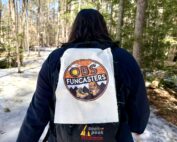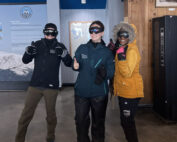Science in the Mountains
2009-07-29 11:12:37.000 – Scott Wehrwein, Summit Intern
NULL
If you’re in the White Mountains area, come check out this evening’s installment of the Mount Washington Observatory’s Science in the Mountains program. Every Wednesday evening of this summer, we’ll be using video conferencing technology to travel to science centers around the world to learn about our environment from experts on various topics.
This week, we’re taking a trip down under to the Reef HQ Aquarium, where just about 65 million years ago, the Australian continent formed a part of the land mass called Gondwana, which was located in the cold southern waters. As it broke away and drifted north into tropical waters, a coral reef system started to grow on the continental shelf along the eastern coastline. Today, covering more than 133,000 square miles, the Great Barrier Marine Park is recognized as a unique area of outstanding value to humankind and a jewel in the crown of the world’s natural wonders.
Admission to this fascinating program is free, so come by the Weather Discovery Center in North Conway at 7 PM and enjoy an evening ‘down under.’
Scott Wehrwein, Summit Intern
Team Flags Return for Seek the Peak’s 25th Anniversary
Team Flags Return for Seek the Peak's 25th Anniversary By MWOBS Staff Mount Washington Observatory is looking forward to continuing a much-loved tradition for Seek the Peak’s 25th Anniversary: Team flags. In inviting teams
Meet Summer Interns Zakiya, Max and Maddie
Meet Summer Interns Zakiya, Max and Maddie By MWOBS Staff We are excited to welcome six teammates to the summit of Mount Washington this summer! During their internship, these students and graduates will play
Saying Goodbye to the Summit
Saying Goodbye to the Summit By Alexis George After an extraordinary last three years working as a Weather Observer and Meteorologist, I am excited to pursue a different career. As sad I as am




